Interview with Todd Decker, Owner, Professional Hearing Services (PHS)
Share:
Topic: The PHS Reality Suite
Paul Dybala: Salutations and greetings to everyone this wonderful morning. This is Dr. Paul Dybala with Audiology Online and today we're spending some time with Todd Decker. Todd is an audiologist and the owner of Professional Hearing Services (PHS) in Watertown, South Dakota. Todd, thanks for spending some time to talk with us today.
Todd Decker: Thank you Paul, I appreciate the opportunity.
Dybala: Well just to start off, can you tell us a little bit about your background?
Decker: Sure, I have a master's degree from the University of Wisconsin-Stevens Point in Audiology, and I'm currently working on my doctorate from the PCO School of Audiology and expect to finish in the spring of 2008. When I completed my master's degree I was hired by a hearing aid manufacturer to be an outside sales representative for about three or four years, and then I managed the government services for them for a year and a half. Then in 2000, I purchased Professional Hearing Services.
Dybala: So, you went directly from working for a manufacturer to going right into private practice. Do you think you had a little bit of an advantage because you saw a lot of different practices, and were exposed to what worked and what didn't?
Decker: Absolutely, Paul. My main goal in graduate school was to investigate working practices prior to starting my own, and thought that manufacturing would be a good avenue to search out the best practices and get ideas from successful practitioners. It helped a lot to see what do to and what not to do.
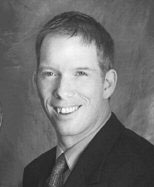
Todd Decker, Audiologist, Owner PHS
Dybala: Tell us more about getting started with PHS.
Decker: PHS had been in business for close to 15 years at the time I purchased it and it had been very successful here in South Dakota. The clientele spans newborns to geriatrics with a wonderful focus on patient care. I found this to be a very attractive business and was blessed to have the opportunity to purchase it.
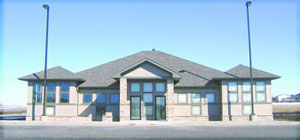
PHS building in Watertown, South Dakota.
Dybala: You mentioned that, even in graduate school, you always wanted to open your own private practice. What has been the motivation that led you in that direction?
Decker: I have always had a vision of how health care should be and I felt the best way I could make it a reality would be to open a private practice, or have a private practice where I could actually implement changes the way I want them instead of having to go through the layers of bureaucracy.
Dybala: Sure, and actually that's a great answer because it segues into what we are talking about today. You have created a virtual environment for your practice called the "Reality Suite". Several of the hearing aid manufacturers have developed similar systems, but just wanted to talk to you about yours and how it works. Could you give us just a basic description of the reality suite? If I'm a patient sitting in a room, what am I seeing, what am I experiencing?
Decker: Well, when you walk in, it's a room about 9 feet wide by 14 deep (in hind sight I would like to have it a little wider). There is a 50-inch plasma television in front of you and a 5.1 surround sound speaker system around you. At my fitting station we have a Crestron controller, which is a touch-screen controller that allows you to implement the audio and visual equipment you want to use.
Dybala: Tell us a little more about the Crestron controller is and how it's important to the whole setup of your reality suite?
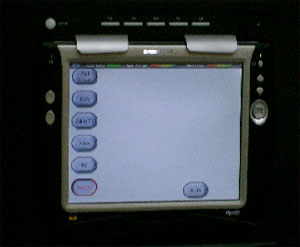
The Crestron Controller
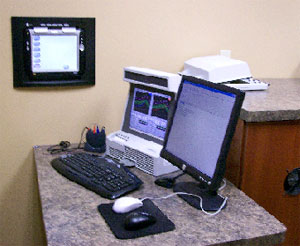
The Crestron Controller (wall) and Programming Software and Hardware (table)
Decker: Well, with all the technology we have in this room, we wanted something that would provide ease-of-use. The Crestron controller is a touch screen universal remote that communicates with all of the audio and visual equipment we have. Instead of having to search for and press four remote controls, I just have a touch screen that, when I touch one button, it sets up the speakers automatically, or the television automatically, for the applications we want to use it for. If I want a split screen with our manufacturers' software on one side and Real Ear on the other side I can do that with the press of one button, and it's automatic. If you want to have just the Xbox showing, I press that and it sets up automatically. It's much more easy and efficient.
Dybala: Yes, I can imagine! You probably would have 12 different remotes otherwise.
Decker: Yeah! The cost is around $5000 for one of these controllers, but the efficiency that you have is definitely worth it.
Dybala: Sure, you've only got half an hour, and you don't have time to flip through programs and screens; you hit one button and everything happens.
Decker: Exactly.
Dybala: What you are describing sounds like what would go into a very high-end media room for a home or theatre. Correct?
Decker: Absolutely. My goal is to make the patient part of the whole process and invite them into how we adjust their hearing devices and actually allow them to see the benefit they are receiving. In order to do that I need to provide them with different sound environments that they encounter day-to-day and show them what's happening with their hearing devices within those environments and try to improve on the benefits the best we can.
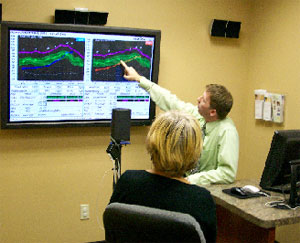
Decker with a patient in the Reality Suite
Dybala: As an example, you might have the hearing aid fitting software up on one screen and at the same time you have this virtual environment where the patient is actually hearing sounds come from all directions: front, back, side, face-to-face.
Decker: Exactly. This is why we had to go with the 50 inch plasma. It allows us to have a split screen, so we can have the fitting software on one half while the other half has cable television, a DVD player, or Real Ear. I even have an Xbox 360.
Dybala: So you have actually fit hearing aids based on games for the Xbox 360?
[laughter]
Decker: Right! [laughter] It's actually for the kids. The kids can play the Xbox 360 while I'm adjusting their aids to real ear verification or taking ear impressions. They're having fun, not thinking about a thing and I am quickly obtaining the information I need from them. It also gives me some fun things to do during lunch hour as well.
Dybala: What is your favorite game and high score then?
Decker: High score I can't tell you, but my favorite game is Madden 2007 or Call of Duty 3.
[laughter]
Dybala: That's a great example. I guess they could even bring in a video that they liked to watch while you're doing real ear and are taking an ear mold impression, etc, huh?
Decker: Yes, "Dora the Explorer" is great for little ones or "Winnie the Pooh" or "Mickey Mouse," any of those types of movies. They're just watching away. Obviously, sometimes you have them muted. That's why I think the Xbox 360 is nice because you don't have to have sound for those games when you're doing your real-ear verifications. It does keep them active, most of the time they don't want to go home or can't wait to come back. It's nice being the cool health care provider.
Dybala: Excellent.
Decker: When we're dealing with patients, what's nice about the reality suite is that it really is like they are in a particular environment, like a restaurant. I can place their spouse right in front of them like they're actually sitting at the table across from each other and have them read something and/or have them ask questions of each other. This suite will be even more effective as the FM and Blue Tooth technology evolves and we begin to incorporate those devices in conjunction with their hearing devices.
When I'm through with their verification I switch to live speech. I can then see exactly how their spouse's voice is coming through the hearing device and what kind of response it is providing. That allows me to manipulate the hearing device, the best I can, in a way that benefits their spouse's voice.
Dybala: It becomes a reality, reality suite at that point.
Decker: Exactly.
Dybala: I would assume that with 160+ channels from the cable television, you have plenty of stimuli to use as well.
Decker: Correct. A lot of times the patient will just use the television. We can turn on CNN or another familiar TV program, and I can monitor live voices, see what the sportscaster's voices are doing with that type of situation and get a better bearing on what's happening with their device and the volume they use it at.
Dybala: That sounds really great. There's software out there from the hearing aid manufacturers that you can use to create similar virtual environments. How does your custom system work with these other systems?
Decker: Well, we use the Starkey "Surround Town" quite often which is nice. I am also looking to expand into using the GN Resound AVENTA, Oticon eCAPS and Phonak multimedia software. I really created the reality suite to work with anything and everything multimedia.
Dybala: From a technical standpoint, was this something that you had to install yourself or did you have to bring in a contractor?
Decker: We had to professionally contract for this with an audio-visual group from Minneapolis. We just recently built this building in the spring of 2006, so we obviously built it for the future.
Dybala: Ballpark, what does this cost you to kind of set up, and how do you feel the return on investment has been, generally speaking?
Decker: This room was about $25,000 since we took a more extreme approach to building it and putting top-of-the-line equipment in it. But I consider that more of a marketing expense than anything, because it's allowing us to do something nobody else is doing in the state of South Dakota to that degree. It separates us from other practices.
We're really seeing a lot of benefit from it. Our return rates were already quite low but now we have had very few within the past six months since we have incorporated this technology. I believe it's reducing the amount of time that we have people coming back for rechecks, because we're getting things right the second or third time they come in, not the fourth or fifth time.
Dybala: It sounds like a pretty amazing system. Do you still have anything that's on a wish list as far as things you'd like to add or where you might see things going in the future? I know your brain is always ticking, so I'm curious to see if anything comes out.
Decker: I think as a profession we are well behind other medical professions as far as counseling our patients with media. I think we need to do a lot better job with multimedia applications. Dentistry, for example, does a phenomenal job of three-dimensional imaging and explaining to the patient what happens with certain diagnosis and what has to be done professionally to treat it. I think we could start looking in on some of those aspects. As we know the baby boomers are coming and I believe the more information we can dispel with visual media the better we can treat them and inform them.
Even our reality suite, as far as the surround-sound situation, still has a long way to go as well, but it's a start. I think we can do a better job of providing more applications and more realistic environments for our patients.
Dybala: I agree. I also had a small epiphany, and I don't know if any of the readers were thinking this too. I think initially I was talking about this as a quote/unquote "fitting" suite. But really, it's more than that. It's a comprehensive reality suite that goes beyond verification. You can counsel a patient about the amount of loss that they have. You can have the spouse listen to a hearing loss simulation. You can take the patient visually through the anatomy and fly through the ear canal, middle ear and cochlea. You could show patients videos on how to clean a hearing aid. I think it's all just now registering with me on what you could really do with this.
Decker: I think you just pressed the point exactly. I think in our counseling we can do so much more and benefit patients so much more. I've built this system hoping that media technology is going to catch up with what we've done here in our practice. My philosophy is to provide the most information that we can, especially now to the baby boomer population. The more information that they have, the more likely they are to answer more of their own questions. But we have to have the best counseling tools, like the reality suite, to accomplish that.
Dybala: That's perfect, Todd. I appreciate you taking time to talk with us today. If anyone wants to contact you for additional information, what's the best way to reach you?
Decker: Well, you can always visit our web site at www.2ears.com and from there you will be able to e-mail me.
Dybala: Excellent. I think that's a great domain name too! Well, thanks again, Todd. I appreciate your time. I wish you the best with your reality suite and your entire practice in the future.
Decker: All right. Thank you, Paul, for the opportunity. I appreciate it.
Todd Decker: Thank you Paul, I appreciate the opportunity.
Dybala: Well just to start off, can you tell us a little bit about your background?
Decker: Sure, I have a master's degree from the University of Wisconsin-Stevens Point in Audiology, and I'm currently working on my doctorate from the PCO School of Audiology and expect to finish in the spring of 2008. When I completed my master's degree I was hired by a hearing aid manufacturer to be an outside sales representative for about three or four years, and then I managed the government services for them for a year and a half. Then in 2000, I purchased Professional Hearing Services.
Dybala: So, you went directly from working for a manufacturer to going right into private practice. Do you think you had a little bit of an advantage because you saw a lot of different practices, and were exposed to what worked and what didn't?
Decker: Absolutely, Paul. My main goal in graduate school was to investigate working practices prior to starting my own, and thought that manufacturing would be a good avenue to search out the best practices and get ideas from successful practitioners. It helped a lot to see what do to and what not to do.

Todd Decker, Audiologist, Owner PHS
Dybala: Tell us more about getting started with PHS.
Decker: PHS had been in business for close to 15 years at the time I purchased it and it had been very successful here in South Dakota. The clientele spans newborns to geriatrics with a wonderful focus on patient care. I found this to be a very attractive business and was blessed to have the opportunity to purchase it.

PHS building in Watertown, South Dakota.
Dybala: You mentioned that, even in graduate school, you always wanted to open your own private practice. What has been the motivation that led you in that direction?
Decker: I have always had a vision of how health care should be and I felt the best way I could make it a reality would be to open a private practice, or have a private practice where I could actually implement changes the way I want them instead of having to go through the layers of bureaucracy.
Dybala: Sure, and actually that's a great answer because it segues into what we are talking about today. You have created a virtual environment for your practice called the "Reality Suite". Several of the hearing aid manufacturers have developed similar systems, but just wanted to talk to you about yours and how it works. Could you give us just a basic description of the reality suite? If I'm a patient sitting in a room, what am I seeing, what am I experiencing?
Decker: Well, when you walk in, it's a room about 9 feet wide by 14 deep (in hind sight I would like to have it a little wider). There is a 50-inch plasma television in front of you and a 5.1 surround sound speaker system around you. At my fitting station we have a Crestron controller, which is a touch-screen controller that allows you to implement the audio and visual equipment you want to use.
Dybala: Tell us a little more about the Crestron controller is and how it's important to the whole setup of your reality suite?


Decker: Well, with all the technology we have in this room, we wanted something that would provide ease-of-use. The Crestron controller is a touch screen universal remote that communicates with all of the audio and visual equipment we have. Instead of having to search for and press four remote controls, I just have a touch screen that, when I touch one button, it sets up the speakers automatically, or the television automatically, for the applications we want to use it for. If I want a split screen with our manufacturers' software on one side and Real Ear on the other side I can do that with the press of one button, and it's automatic. If you want to have just the Xbox showing, I press that and it sets up automatically. It's much more easy and efficient.
Dybala: Yes, I can imagine! You probably would have 12 different remotes otherwise.
Decker: Yeah! The cost is around $5000 for one of these controllers, but the efficiency that you have is definitely worth it.
Dybala: Sure, you've only got half an hour, and you don't have time to flip through programs and screens; you hit one button and everything happens.
Decker: Exactly.
Dybala: What you are describing sounds like what would go into a very high-end media room for a home or theatre. Correct?
Decker: Absolutely. My goal is to make the patient part of the whole process and invite them into how we adjust their hearing devices and actually allow them to see the benefit they are receiving. In order to do that I need to provide them with different sound environments that they encounter day-to-day and show them what's happening with their hearing devices within those environments and try to improve on the benefits the best we can.

Decker with a patient in the Reality Suite
Dybala: As an example, you might have the hearing aid fitting software up on one screen and at the same time you have this virtual environment where the patient is actually hearing sounds come from all directions: front, back, side, face-to-face.
Decker: Exactly. This is why we had to go with the 50 inch plasma. It allows us to have a split screen, so we can have the fitting software on one half while the other half has cable television, a DVD player, or Real Ear. I even have an Xbox 360.
Dybala: So you have actually fit hearing aids based on games for the Xbox 360?
[laughter]
Decker: Right! [laughter] It's actually for the kids. The kids can play the Xbox 360 while I'm adjusting their aids to real ear verification or taking ear impressions. They're having fun, not thinking about a thing and I am quickly obtaining the information I need from them. It also gives me some fun things to do during lunch hour as well.
Dybala: What is your favorite game and high score then?
Decker: High score I can't tell you, but my favorite game is Madden 2007 or Call of Duty 3.
[laughter]
Dybala: That's a great example. I guess they could even bring in a video that they liked to watch while you're doing real ear and are taking an ear mold impression, etc, huh?
Decker: Yes, "Dora the Explorer" is great for little ones or "Winnie the Pooh" or "Mickey Mouse," any of those types of movies. They're just watching away. Obviously, sometimes you have them muted. That's why I think the Xbox 360 is nice because you don't have to have sound for those games when you're doing your real-ear verifications. It does keep them active, most of the time they don't want to go home or can't wait to come back. It's nice being the cool health care provider.
Dybala: Excellent.
Decker: When we're dealing with patients, what's nice about the reality suite is that it really is like they are in a particular environment, like a restaurant. I can place their spouse right in front of them like they're actually sitting at the table across from each other and have them read something and/or have them ask questions of each other. This suite will be even more effective as the FM and Blue Tooth technology evolves and we begin to incorporate those devices in conjunction with their hearing devices.
When I'm through with their verification I switch to live speech. I can then see exactly how their spouse's voice is coming through the hearing device and what kind of response it is providing. That allows me to manipulate the hearing device, the best I can, in a way that benefits their spouse's voice.
Dybala: It becomes a reality, reality suite at that point.
Decker: Exactly.
Dybala: I would assume that with 160+ channels from the cable television, you have plenty of stimuli to use as well.
Decker: Correct. A lot of times the patient will just use the television. We can turn on CNN or another familiar TV program, and I can monitor live voices, see what the sportscaster's voices are doing with that type of situation and get a better bearing on what's happening with their device and the volume they use it at.
Dybala: That sounds really great. There's software out there from the hearing aid manufacturers that you can use to create similar virtual environments. How does your custom system work with these other systems?
Decker: Well, we use the Starkey "Surround Town" quite often which is nice. I am also looking to expand into using the GN Resound AVENTA, Oticon eCAPS and Phonak multimedia software. I really created the reality suite to work with anything and everything multimedia.
Dybala: From a technical standpoint, was this something that you had to install yourself or did you have to bring in a contractor?
Decker: We had to professionally contract for this with an audio-visual group from Minneapolis. We just recently built this building in the spring of 2006, so we obviously built it for the future.
Dybala: Ballpark, what does this cost you to kind of set up, and how do you feel the return on investment has been, generally speaking?
Decker: This room was about $25,000 since we took a more extreme approach to building it and putting top-of-the-line equipment in it. But I consider that more of a marketing expense than anything, because it's allowing us to do something nobody else is doing in the state of South Dakota to that degree. It separates us from other practices.
We're really seeing a lot of benefit from it. Our return rates were already quite low but now we have had very few within the past six months since we have incorporated this technology. I believe it's reducing the amount of time that we have people coming back for rechecks, because we're getting things right the second or third time they come in, not the fourth or fifth time.
Dybala: It sounds like a pretty amazing system. Do you still have anything that's on a wish list as far as things you'd like to add or where you might see things going in the future? I know your brain is always ticking, so I'm curious to see if anything comes out.
Decker: I think as a profession we are well behind other medical professions as far as counseling our patients with media. I think we need to do a lot better job with multimedia applications. Dentistry, for example, does a phenomenal job of three-dimensional imaging and explaining to the patient what happens with certain diagnosis and what has to be done professionally to treat it. I think we could start looking in on some of those aspects. As we know the baby boomers are coming and I believe the more information we can dispel with visual media the better we can treat them and inform them.
Even our reality suite, as far as the surround-sound situation, still has a long way to go as well, but it's a start. I think we can do a better job of providing more applications and more realistic environments for our patients.
Dybala: I agree. I also had a small epiphany, and I don't know if any of the readers were thinking this too. I think initially I was talking about this as a quote/unquote "fitting" suite. But really, it's more than that. It's a comprehensive reality suite that goes beyond verification. You can counsel a patient about the amount of loss that they have. You can have the spouse listen to a hearing loss simulation. You can take the patient visually through the anatomy and fly through the ear canal, middle ear and cochlea. You could show patients videos on how to clean a hearing aid. I think it's all just now registering with me on what you could really do with this.
Decker: I think you just pressed the point exactly. I think in our counseling we can do so much more and benefit patients so much more. I've built this system hoping that media technology is going to catch up with what we've done here in our practice. My philosophy is to provide the most information that we can, especially now to the baby boomer population. The more information that they have, the more likely they are to answer more of their own questions. But we have to have the best counseling tools, like the reality suite, to accomplish that.
Dybala: That's perfect, Todd. I appreciate you taking time to talk with us today. If anyone wants to contact you for additional information, what's the best way to reach you?
Decker: Well, you can always visit our web site at www.2ears.com and from there you will be able to e-mail me.
Dybala: Excellent. I think that's a great domain name too! Well, thanks again, Todd. I appreciate your time. I wish you the best with your reality suite and your entire practice in the future.
Decker: All right. Thank you, Paul, for the opportunity. I appreciate it.

